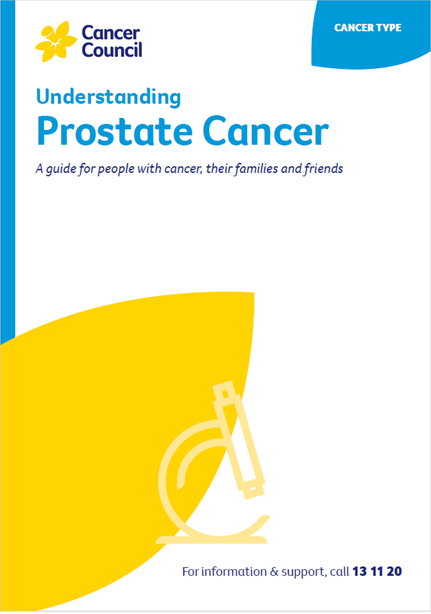- Home
- Prostate cancer
- Managing side effects
- Urinary problems
Urinary problems
Trouble controlling the flow of urine (urinary incontinence) is a common side effect of some treatments for prostate cancer.
Learn more about:
- Managing urinary issues after surgery
- Managing urinary issues after radiation therapy
- Coping with urinary incontinence
- Video: Pelvic floor exercise for females and males
Managing urinary issues after surgery
After prostate surgery, issues with urinary incontinence are common for several weeks or months and usually improve slowly over time. Most people will need to use incontinence pads in the first few weeks after surgery. Only a small number will need to use incontinence pads long term. You may find that you:
- lose a few drops of urine when you cough, sneeze, strain or lift something heavy
- leak some urine during sex
- have blood in your urine that may last a few weeks.
Managing urinary issues after radiation therapy
Urinary problems caused by radiation therapy are usually temporary and tend to improve within a few months of finishing treatment. In some cases, radiation therapy can:
- reduce how much urine the bladder can store
- irritate the bladder
- narrow the urethra
- weaken the pelvic floor muscles.
You may also find that you need to pass urine more often or in a hurry, or that you have difficulty passing urine. Sometimes, medicines or surgery can improve urine flow – ask your doctor if this is an option for you.
Coping with urinary incontinence
- Start pelvic floor exercises before surgery to help reduce the likelihood of ongoing urinary incontinence after surgery. The exercises are also important after surgery.
- Ask your doctor, urologist, continence physiotherapist or continence nurse about how to correctly do pelvic floor exercises.
- Drink plenty of water to dilute your urine – concentrated urine can irritate the bladder.
- Keep drinking plenty of fluids, even if you are afraid of leakage. Dehydration can cause constipation, which may also lead to leakage and difficulty passing urine.
- Limit tea and coffee as they contain caffeine, which can irritate the bladder. Alcohol and carbonated drinks may also irritate the bladder.
- Talk to a continence nurse or continence physiotherapist about continence products if needed. These include absorbent pads to wear in your underpants, and bed and chair covers. They may also recommend medicines or a special plastic clamp for your penis.
- Ask your continence nurse or GP if you can apply for the Continence Aids Payment Scheme. This is a yearly payment to help cover the cost of continence products.
- If incontinence does not improve after 6–12 months, talk to your doctor or urologist about whether surgery is an option. For example, a surgically inserted sling or artificial sphincter works by pulling the urethra up to help the sphincter muscle close more effectively.
- Get resources from the Prostate Cancer Foundation of Australia 1800 22 00 99 and the Continence Foundation of Australia 1800 33 00 66.
- See Exercise for people living with cancer, this includes information on pelvic floor exercises.
- Watch a webinar on Incontinence after Cancer.
→ READ MORE: Other changes to your sexual function
Video: Pelvic floor exercise for females and males
Podcast for people affected by cancer
Listen now
More resources
Prof Declan Murphy, Consultant Urologist, Director – Genitourinary Oncology, Peter MacCallum Cancer Centre and The University of Melbourne, VIC; Alan Barlee, Consumer; Dr Patrick Bowden, Radiation Oncologist, Epworth Hospital, Richmond, VIC; Bob Carnaby, Consumer; Dr Megan Crumbaker, Medical Oncologist, St Vincent’s Hospital Sydney, NSW; Henry McGregor, Health Physiotherapist, Adelaide Men’s Health Physio, SA; Jessica Medd, Senior Clinical Psychologist, Department of Urology, Concord Repatriation General Hospital and Headway Health, NSW; Dr Gary Morrison, Shine a Light (LGBTQIA+ Cancer Support Group); Caitriona Nienaber, 13 11 20 Consultant, Cancer Council WA; Graham Rees, Consumer; Kerry Santoro, Prostate Cancer Specialist Nurse Consultant, Southern Adelaide Local Health Network, SA; Prof Phillip Stricker, Chairman, Department of Urology, St Vincent’s Private Hospital, NSW; Dr Sylvia van Dyk, Brachytherapy Lead, Peter MacCallum Cancer Centre, VIC.
View the Cancer Council NSW editorial policy.
View all publications or call 13 11 20 for free printed copies.

